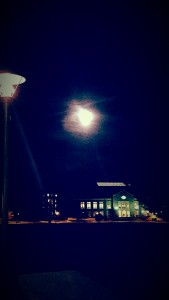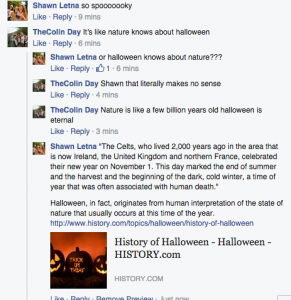Every so often, a bunch of relevant things will align to create an incredibly ironic, yet meaningful, moment. While scrolling through Facebook, I came across this status posted by a good friend of mine:
So I turned around and saw this:
A bright and ever so appropriately spooky moon was creeping over Farinon. I replied to Colin’s status, implying how perfectly the moon fit the upcoming holiday. The following comment thread continued:
I found Colin’s first reply comment painfully ironic for the fact that Halloween, like most holidays with deep historical roots, is based off of the seasonal changes in the natural world. This prompted me to think “no, Colin, nature does not ‘know’ about Halloween and then, to keep in theme, decorate itself with an incredibly spooky, cloud covered moon” and consequently reply to his comment by flipping it around. Then, in a moment even more relevant to our class, Colin claimed that my correction made no sense! To me, this represents a phenomenon that is present throughout Nature Wars: despite the fact that we still live in the forest/nature, we often forget or ignore that nature has always shaped human culture and will continue to do so!
To further explain myself, I cited a page about the history of Halloween to prove that Halloween ‘knows about’ nature because it would not exist without the progressions of nature. (Aside: I have a tendency to include sources in my Facebook comments when I’m trying to argue with someone. Some find it annoying, I find it essential to any good internet disagreement.) Some may even argue that Halloween is the most appropriate example of a holiday that exists because of how nature interacts with and affects civilization. Our modern traditions still reflect the death that came with the beginning of the cold season in the representation of zombies, ghosts, and various spooky/scary/undead symbols of Halloween. We trek through corn mazes and carve pumpkins and make scarecrows out of hay. Exploring the history of Halloween could actually make for a great analysis of how human culture interacts with nature because Halloween knows about nature.




Shawn, very cool thoughts here thoughts here. I think some holidays are really good examples of how nature has influenced our culture. Out of curiosity I went looking for some more nature influenced holidays! It would seem nature has been very influential in religious holidays. In particular I found some more Pagan holidays influenced by nature such as: Yule (winter solstice), Imbolc (coming of spring), Ostara (spring equinox), Beltane (greening of land), Litha (summer solstice), Lamma (fields full of grain), and Mabon (autumn equinox).
http://paganwiccan.about.com/od/wiccaandpaganismbasics/tp/The-Eight-Pagan-Sabbats.htm
Shawn, very cool thoughts here. I think some holidays are really good examples of how nature has influenced our culture. Out of curiosity I went looking for some more nature influenced holidays! It would seem nature has had quite the influence. In particular I found some more Pagan holidays influenced by nature such as: Yule (winter solstice), Imbolc (coming of spring), Ostara (spring equinox), Beltane (greening of land), Litha (summer solstice), Lamma (fields full of grain), and Mabon (autumn equinox).
http://paganwiccan.about.com/od/wiccaandpaganismbasics/tp/The-Eight-Pagan-Sabbats.htm